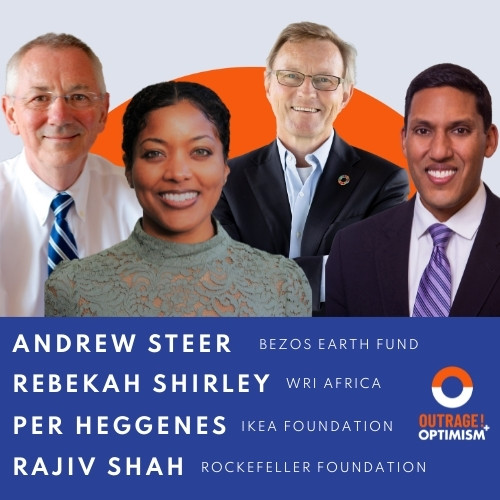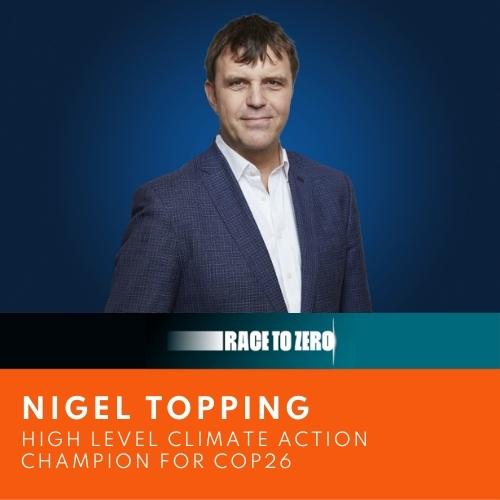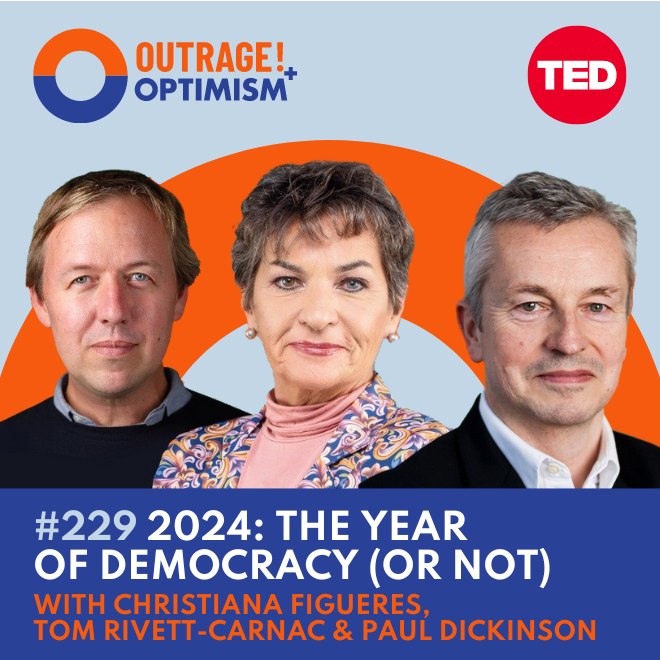122: What The Hale?! Introducing the Net Zero Tracker with Thomas Hale
Tom Hale is BACK and here to announce the official Launch of the Net Zero Tracker!
About this episode
So yes - this week we have Associate Professor in Global Public Policy at Oxford University, Tom Hale, who joined us back in March of this year discussing the launch of a report “Taking Stock of commitments to Net Zero”. That report put a spotlight on the credibility of a wave of government and business net zero commitments at the time. He is now returning more triumphant than ever with a significant update - the launch of a publicly available Net Zero Tracker!
It’s a big deal.
Our host, Paul Dickinson jumps in to ask, What the Hale IS the Net Zero Tracker? And how is it creating radical transparency that will lead to actually limiting global heating to 1.5C?
In tandem with the Net Zero Tracker is a new release as well, The Net Zero Dashboard Codebook - filled with terms to bring absolute clarity to Net Zero pledges, promises, and commitments... so what the Hale do all these terms mean? Stick around for our classic Lightning Round. This is a fun one.
The Race to Zero continues!
—
Links mentioned in the show:
- Net Zero Tracker
- UNEP Gap Report
- Oxford English Dictionary Climate Words Added
- NYT Visualization of Emissions Pre-Paris vs Current vs Pledged vs Necessary for 1.5C
- Race to Zero: Twitter | LinkedIn
- COP26 - UN Climate Change Conference: Twitter | Instagram | LinkedIn
Watch
Full Transcript
Transcript generated by AI. While we aim for accuracy, errors may still occur. Please refer to the episode’s audio for the definitive version
Paul: [00:00:00] Hello! I’m Paul Dickinson and welcome to this special episode of Outrage + Optimism!, where we are very excited to present the second installment of our What the Hale?! mini series by welcoming back Thomas Hale, Associate Professor in Global Public Policy at Oxford University. Thomas joined us back in March this year to discuss the launch of a report taking stock of global assessment of net zero targets. That report shone a light on the credibility of the wave of government and business net zero commitments, and is now back with a significant update: the launch of a publicly available net zero tracker. But rather than explain the net zero tracker myself, let’s get right to it. Here is my conversation with Tom about this exciting new launch.
Paul: [00:01:32] Welcome back to the podcast Tom. Now, the net zero tracker officially launched today.
Tom Hale: [00:01:40] We are. It’s coming out on Wednesday, excitedly.
Paul: [00:01:43] Congratulations. What were the main aims of the launch of this tracker?
Tom Hale: [00:01:46] The net zero tracker is aiming to record not just the quantity, but also the quality of net zero targets from cities, from businesses, from regions and from countries, and putting it all together in an easy to access and publicly available source.
Load MorePaul: [00:02:04] Tell me, why is it important that you’re launching this publicly facing net zero tracker now? Especially the time when the number of net zero commitments from businesses and governments seem to have exploded in the public arena.
Tom Hale: [00:02:18] So, net zero has really gone from sort of obscure scientific concept to a central organizing principle for addressing climate change in a remarkably short period of time. But the question we now really have is how do we make it robust? Because it becomes so popular so quickly, that it's kind of outpaced the systems and the processes, we have for making sure it has real science based meaning. And so we needed a tracker like this to be able to help us understand not just where net zero targets are being made, but how vigorous and robust they actually are.
Paul: [00:02:51] So Tom, can you clarify for our listeners the relationship between net zero targets and the need to limit global temperatures to no more than a 1.5 degrees Celsius rise.
Tom Hale: [00:03:01] In 2015 countries agreed in the Paris Agreement to try to limit temperatures to changing no more than 1.5 degrees Celsius in this century. What that means is they need to bring their total level of emissions down to a net balance between sources and sinks, that is to net zero by the middle of the century, indeed, by 2050 at the very latest globally. That means that every single piece of the world economy, every country, every city, every business needs to follow a trajectory that's a line of that global goal. That's why net zero targets are so important for achieving this goal set out in the Paris agreement of limiting temperature rise to 1.5 degrees Celsius.
Paul: [00:03:41] That definition is really helpful. Has there been any attempt to regulate the voluntary net zero commitments so far?
Tom Hale: [00:03:51] So the meaning of net zero is extremely clear in global climate science, but it's still being operationalized the actual practice of countries and companies of cities of other kinds of actors. That means it's still quite a lot to figure out in terms of how a robust system for ensuring alignments to net zero actually looks. We're seeing a lot of targets now coming out that are voluntary nature. So businesses, for example, are making voluntary pledges. But also increasingly, we're seeing new kinds of systems that are asserting trying to qualify a credit for those kinds of voluntary pledges. So things like The Science Based Targets Initiative, things like The Climate Pledge, things like the city's Race to Zero campaign for cities. Many of these are also part of the UN's race to zero campaign, which is obviously a big feature of Outrage and Optimism. And so that's trying to outline some minimum criteria that all of these pledges need to make, need to meet rather, in order to show that they're credible and serious. And that's what the tracker is going to be showing. It's going to shine which of these targets exist and to what extent they have these criteria for success.
Paul: [00:04:50] So, it seems net zero are not all created equal. Can you explain, Tom, the different types of net zero targets we’re seeing being publicly announced by companies?
Tom Hale: [00:05:02] Happily. For example, some net zero targets are just in a press release or in a statement that the leader makes at a conference. Some are actually enshrined in national laws. Some are enshrined in corporate strategies. Some are enshrined in the management KPIs that CEOs have to meet for their boards need to show that kind of difference. Also, some net zero targets, for example, don't cover all of an entity's emissions. They only cover maybe the direct operational emissions and say, a company's offices or in its business travel. We don't actually measure the emissions embodied in its products and services, so that's a huge area as well. So even though it's still quite a lot to figure out in terms of how we get to net zero and how we operationalize it, in practice, this is rapidly shifting and we have a pretty clear set of ideas now for what makes a net zero target better and what makes it not really up to the bar yet. That's the interesting transition we're going through now.
Paul: [00:05:50] Tom, it looks like you’ve been working very hard because you’ve evaluated over 4,000 net zero commitments to begin with from all these different sectors. From national commitments, to oil and gas companies, financial institutions and so on, they’ve all got a wide range of framings for their net zero commitments as you’ve pointed out. Will the net zero tracker enable us to see who the leaders are in each of those sectors?
Tom Hale: [00:06:23] If you look at the whole global picture, we can already begin to see maybe not necessarily a ranking of one two three four five, but definitely those that are toward the top of the pack and those that are lagging behind. So let's look for example, at the G20 countries, which are meeting at the end of this week right before COP26 in Glasgow. So, you know 17 of the 20 members have some kind of commitment for net zero. That's a lot more than you had at this time last year. So only three G20 countries are not yet part of this pack in there. That might even change before this episode comes on the air, so this is an exciting kind of moment to watch. But others 17 with a commitment, only five of those are actually enshrined in law at this stage. So those are Canada, the U.K., Germany, France and the European Union. And so others need to step up and bring their pledges into line with these kinds of more rigorous limits and make further commitments. And that's the next step. But zooming out a little bit and looking at the whole global picture, we see these sort of two truths at the same time. And I know that on Outrage and Optimism, as the name implies, there is really an important need to look at both the positive and also what we still need to do. So on the positive side, the share the world economy that's covered by these net zero pledges - looking only at country commitments for the moment - is really growing a lot now, it basically is at 80 percent of global GDP measured in purchasing power parity terms. That's up from 68% last year. It's over three quarters of global emissions. That's up from 60% last year. So it's a big, big step forward. But if you drill down to see which of those countries have pledges that are actually at the top tier of robustness, it’s something more like 10% of global GDP and 5% global emissions. So there's been progress there as well. The number of countries that have had these commitments has more has doubled in the last year, so that's important progress, but we still have a ways to go. So we've got the outrage that there's not more firm net zero commitments; that's right. We've also got the optimism that this is spreading really quickly to really reframe the debate away from ‘What are we going to do? Should we even bother about this whole decarbonisation thing overall’, to actually not a question of debating that, but instead debating ‘How quickly are we going to get there?’, which is a much more productive place to be.
Paul: [00:08:33] Absolutely and there is a wide understanding of how important this size of action actually is. Especially, as we head into COP26 with the hope that countries will step up their ambition urgency, demanding about the climate crisis. So, will the net zero tracker enable the public to actually see this commitment in action and stack up against the scientific goal of halving global emissions by 2030, which is necessary in order to meet net zero by 2050?
Tom Hale: [00:09:01] So a lot of the world has sort of thought, well, net zero 2050, that sounds like a long time from now. We can maybe not worry about this until, say, 2045 or so, then come back and see what the deal is. But of course, that's not right. If you’re going to be something that's radically ambitious to decarbonise the entire world economy in a few short decades, then you really had to start yesterday, would have been best, but today is the second best time to start. So urgent action this decade is absolutely critical for the credibility of these 10 zero targets, and we're going to be seeing an increasing number of reports, for example, from UNEP, the Gap report this week outlining exactly where national NDCs are in terms of short term action and how that aligns, or in too many cases doesn't align, to where countries should be given their net zero commitments. And we see that also with firms. In companies, we all know they need to be setting short term targets that are commensurate to the contributions of setting to make, to halving global emissions by this decade.Initiatives like the Science Based Targets Initiative are helping to define what that means. But this net zero tracker will also be helping to show and shine a spotlight on those companies that aren't even at that stage yet. So again, we see some progress here and also see some work that's still needed. Last year, when we did this, we saw one in five of all the largest companies in the world had a net zero target. So a good chunk, but not necessarily where we want it to be this year. That's now down to one in three. So we are making significant progress in getting companies to align to where they need to go. However, of those company targets, there's still quite a few that need to get more robust. Maybe only about one in 10 of them at the level of where we’d like them to go in terms for aligning to the short term goals. So again, a little bit of outrage that it's not higher, but a little bit of optimism that the rate of change is actually quite impressive.
Paul: [00:10:44] Will the net tracker give us like a scorecard that shows how we’re racing to the bottom of the emissions trajectory? I mean, will it allow us to kind of compare across different industries of different types?
Tom Hale: [00:10:57] Absolutely. So the net zero tracker will give us a tool to see which of these net zero targets have which specific criteria. For example, does this target have an interim goal in the short term that's going to be helping them get on the right trajectory? Does it have an accountability mechanism? Does it have coverage of all the negative emissions? Does it provide clarity on the use of offsets or not use of offsets, whatever the case may be. These are the kinds of questions that we need to be asking for every net zero target, and we're going to be providing all the information we can about how these different criteria do stack up. So just to take some examples, if you look at the global large oil companies, actually a number of them now do have net zero targets, even some ones that were particularly resistant to climate policy for a long time. But if you look into the details, you'll see very few of those actually cover all of their so-called scope three emissions, all of the emissions that are produced by the products they make like fossil fuels. So this is a really important area where different companies can be separated from each other. The same for nations, there's a lot of ones that have much more targets in law and press releases. These are important devices to drill down into as well.
Paul: [00:12:03] Fundamentally, Tom, what does the net tracker do to help the credibility of net zero. How important is this tracker to net zero?
Tom Hale: [00:12:11] I think it’s particularly important, because if we look at the broader public debate now around net zero you see a real effort by some of the sectors, some of the companies in particular, who are less excited about climate action to in some ways co-opt net zero. Right, we’re saying we’re going net zero it’s going to be there at the end of the century, or the middle of the century, don’t worry we’re on the right track. And some people in the climate community have seen that as, well actually this means that maybe net zero isn't that useful thing, if you know Saudi Arabia or Russia or Exxon can all say they're going net zero. Actually, Exxon hasn't said that, there's a key difference there. But if Saudi Arabia and Russia can say it, you know, does that mean it's really worthless? I think actually, it means that we won an important victory in terms of shifting the debate toward, away from not doing anything, to kind of debate about what we are going to do. But it means we absolutely need a tracker like this one to be able to separate those targets that are robust from those that are. Because the question isn't so much is net zero or not the right thing to go. And the science is extremely clear on that, net zero is the only way to stop climate change. We need to go for it, but we need to put a lot of scrutiny and a lot of clarity around how different entities are aligning toward that science or not.
Paul: [00:13:22] Okay great. We do understand, thank you, what the net zero tracker is. Can you tell us who are the organisations behind this? Are they independent? It would be great to hear some of that story.
Tom Hale: [00:13:34] So the net zero tracker is aiming to be a gold standard for independent verification of the credibility of net zero targets. It's a project of four different organizations. Us at Oxford University, also the Energy Climate Intelligence Unit (ECIU), the New Climate Institute and also the Data Driven and Bio Lab at the University of North Carolina. So it's four independent organizations that have come together with funding from the European Climate Foundation in order to try and create this global benchmark standard. And it's really trying to draw on a mix of two different ways of gathering information. One is using some sophisticated AI and machine learning to scan the web to see where new information emerges about a different target, sorry, a different actor, and then putting that information to a global team of volunteers who are trained to be able to sort through that information and put it into our standardized categories. So it's really kind of a marriage of citizen science and data science to try to give a product that's based on publicly available information. And so it's basically entirely traceable. So in the net zero tracker, you won't find too much opinion or evaluation by us. It will be rather an aggregation of information in a way that’s useful for a whole different range of stakeholders. So if you have any thoughts about what we've missed or maybe mischaracterized, get in touch because this is all about empowering everyone really to be able to track net zero for their city, for the companies they work for, care about and for the country to live in. So this is a kind of tool I hope we can all use to try to wrap our heads around this very complicated, but super important topic.
Paul: [00:15:10] Absolutely. Super complex. Tom you mentioned that some campaigners have been worried about the use of net zero as a potential greenwashing exercise. They are quite critical of it within the climate movement. Have you been in dialogue with those groups and what responses have you had to the tracker?
Tom Hale: [00:15:29] So net zero has become operationalized far too quickly in some ways. Obviously not too quickly from a climate science perspective but it's very much in the early days of figuring out what a hard and credible system for verifying net zero looks like. The pressure we see from civil society groups to really get it right is exactly the right kind of intervention in this space. We need to have scrutiny, we need to have a real pressure on all actors setting net zero targets to make sure they're doing it in the right way. So we've been working closely with that community. We've been sharing our thoughts on what we can gather, to try to inform what judgements people will be drawing about its targets. And so this is a tool, a resource, for entities themselves or companies that are buying their products or citizens that are buying their products, for their citizens that are voting in elections, for investors, for anyone who wants to check whether a particularly part of the world is on track or not on track. This is a tool you can use to help hold them to account. So I hope people will take that up with that spirit.
Paul: [00:16:33] So we’ve called this series What the Hale?! And big shoutout to Clay for this excellent naming protocol. Now because of your tremendous ability to bust through the climate jargon and bring clarity to our listeners on what these often quotes, sometimes misunderstood terms really mean in the real world, can we have a quick lightning round of definitions, if we may, starting with net zero?
Tom Hale: [00:17:00] So net zero means radically reducing emissions immediately to try to get them down to as little as possible by the middle of the century and then neutralize any emissions that might remain with permanent removals in order to achieve a balance between sources and sinks and therefore prevent further climate change.
Paul: [00:17:15] And what about zero emissions?
Tom Hale: [00:17:17] Zero emissions refers to just getting to 100 percent zero emissions, so nothing can be out of your company, your city, your country into the atmosphere.
Paul: [00:17:27] And what about zero carbon?
Tom Hale: [00:17:30] Zero carbon means that carbon dioxide, the main but not the only greenhouse gas, has been brought to zero. This is the most important one because we know we need to get to zero carbon first before we tackle the other greenhouse gases. It's just the biggest piece of the puzzle.
Paul: [00:17:43] Okay. What about climate neutral?
Tom Hale: [00:17:47] So climate neutral is used in a number of different ways, but I think the most useful definition is to say that the amount of emissions coming out of the entity every year are matched by anything they're taking out of the atmosphere in response. But it doesn’t necessarily mean that those things that are going in and those that are coming out are exactly like, for instance, the timescale in which they persist in the atmosphere. So it might mean, for example, your digging up fossil carbon and using it to drive a car and then planting some trees to try to suck out some of that carbon in order to balance it out. But if those trees are going to take twenty five years to grow and that fossil carbon has been in the ground for, say, a few thousand years, then it's not really exactly like for like. So that's one where we need a bit more clarity.
Paul: [00:18:34] And what about the meaning of climate positive?
Tom Hale: [00:18:40] So I really like the term climate positive. I think this is an excellent goal for organizations, especially corporate companies, to strive for, and it means that their overall operations are not just net zero but net beneficial to the climate, so they might be taking out more from the atmosphere than they're putting in. That means they're not just trying to not be a problem, but actually actively becoming part of the solution. And so this is an excellent goal for companies in particular to strive for.
Paul: [00:19:05] Great. So net zero is often used interchangeably with GHG or greenhouse gas neutral and the term carbon neutral. Can you help our listeners understand What the Hale?! is the difference between them?
Tom Hale: [00:19:21] So a lot of different actors might use terms like net zero or carbon neutral or greenhouse gas neutral, or these things are different and so in interchangeable ways, and also differs a lot by language. So the term net zero is very commonly used in English, but it's less common in Spanish or in French. In Chinese that refer to these kinds of things as net zero. So there is a little bit of different usage across different contexts in different popular speech. But I think there's a useful scientific distinction to be drawn between net zero, which I think must include this idea of like for like balancing between sources and sinks so that what you're taking out of the atmosphere is really matching anything you're putting in so that it's no further contribution to climate change. I think climate neutral or carbon neutral or greenhouse gas neutrality is a little bit looser. It maybe implies that even though the absolute flows in any given year, what's coming in, what's going out are the same, it doesn't really necessarily imply that the overall atmospheric impact of those things are the same. This doesn't have the same sort of timescale component to it. In other words, the timescale that carbon mass that you're putting the atmosphere might be longer than the timescale, the trees that we planted to try to remove it. So it's a small, quite technically nuanced but really important one, because I think we it really is at the heart of why the discussions in net zero have been so controversial about offsetting where sort of not enough to kind of just get to a static state of not net zero carbon neutrality with balances between sources and sinks. You're not also really driving down emissions to the point where you can permanently neutralize any remainder. It’s that permanent neutralization that makes the net credible or not credible.
Paul: [00:21:02] Just to clarify Tom, can a business say they are net zero without cutting their emissions?
Tom Hale: [00:21:07] So I think it's really important to distinguish the time frame that we're talking about when we talk about net zero. Net zero must mean radically reducing emissions in the short term and then only at the point where they're quite small, figuring out how to permanently neutralize a small bit that remain. And so if you're a company or a country or a city or anything that's trying to get onto a net zero pathway, you're, of course, over the next five, 10, 15 years be pretty clear. It has to be radical emissions cuts. There's just no other way to get there. So if you're not doing radical emissions cuts, you're probably not doing net zero right. It doesn't mean you shouldn’t also be investing in nature investing solutions, investing in the long term technologies that might help us to permanently initiate things once we get to the speed of residual emissions a few decades from now. But that's not your first point of call. They call this in the technical literature sometimes, the mitigation hierarchy. Meaning we mitigate first and only then come to the question of how to net.
Clay: [00:22:03] So, Tom, whilst we’re throwing terms at you in our lightning round, i’m gonna jump in here because I encountered a new term that maybe you can help me out with. My one year old son, he drinks milk, and I was staring into the fridge the other day and saw on the milk carton that the company is saying that they are going carbon positive by 2025. I’d never seen carbon positive before but I kind of assumed I knew what that meant. And so later in the evening, my wife and I were out on a date and I said, Hey, I saw on the milk carton that you bought that the company is going carbon positive by 2025; did you see that? And she said, carbon positive, don't they mean carbon negative? And I didn’t know. So help me. Carbon positive, what do they mean by that?
Tom Hale: [00:22:58] It's a great question, so I think we've seen with this wild west operationalization of that zero, a real kind of confusion between what the science is actually asking us to do and then what looks good when you put it on a milk carton. Well, that's good from a marketing perspective. So I have to expect that they mean to be carbon negative, meaning they're taking out more carbon than they're putting into the world. But probably they thought negative doesn't really sound like something we should put on something we want people to buy, so let's call it carbon positive instead. I think climate positive is a bit more helpful though, right? Because it's saying what you're doing is helping the climate. If you're trying to make carbon positive, that's not really the direction we should be going. So maybe that's an opportunity for them to upgrade their terminology. But this is exactly why we need standards, why we need to really think about moving this from a kind of voluntary space to a regulatory space because we need clarity on all of these things, so that people that buy milk or people that think about how the world's going to evolve over the next three decades, can make clear choices.
Clay: [00:24:02] Well, sounds like I need to send them an email and say, please listen to this episode with Tom Hale. He’ll clearly describe to you why you need to change what you're saying on your milk cartons. Thank you very much. Thanks for indulging me.
Tom Hale: [00:24:15] I really hope that’s very helpful.
Paul: [00:24:16] That is super helpful. Now, Tom, can you please let our listeners know where they can find the net zero tracker online?
Tom Hale: [00:24:27] The net zero tracker can be found at zerotracker.net, see what we did there.
Paul: [00:24:34] Okay, the net zero tracker can be found at zerotracker.net. Super cool, super confusing. Let’s just break this out because it’s important. We believe in the internet. www.zerotracker.net. Tom, we really appreciate the time you’ve taken today. Thank you so much on behalf of me, Clay, all our listeners. It’s so good to get better understanding because we’re understanding that we can fix this thing. Cheers Tom.
[theme song]
Clay: [00:25:13] So, Race to Zero, What the Hale?!. Hey everyone, this is Clay at the end of the show. We have another episode coming tomorrow regarding China and COP26, so make sure that you hit subscribe and don’t miss it. Thank you so much to Tom Hale for bringing the knowledge to us this week. If, like me, you need help to decode the mysterious claims of marketeers or and more importantly, if you're a business or organisation setting net zero targets and you want to be able to benchmark yourselves reliably against science and your peers, the net zero tracker is a radically transparent tool created and run by a collaboration of scientists and volunteers. It is essential for multi stakeholders consumers, investors, business partners and their critics to push for more action and more actions what's needed. So links in the show notes to the net zero tracker. Thank you to Tom Hale.
Clay: [00:26:15] Okay, a couple things to mention regarding net zero for further reading this week. I posted the UNEP gap report that Tom mentioned in our conversation. And I also posted a tweet from the director of Carbon Brief Leo Hickman. He posted that the Oxford English Dictionary added some climate words to the Oxford English Dictionary, including net zero. So you know, topical. Check it out.
Clay: [00:26:44] And the last thing I want to share with you is in the show notes I've posted a visualisation from the New York Times of global emissions. It shows where we were pre Paris, versus where we currently are, versus what the current pledges are, versus what is actually necessary for 1.5. It kind of graphs them all together. Now, I really hesitate to recommend anything that has a paywall, so apologies for that. Maybe there's a free trial of the New York Times but if you can access it, it is really well laid out. I'll look for another one that's free to share. So lots for you to check out before COP26. See you tomorrow for another episode.
Your hosts

Paul Dickinson
Guests


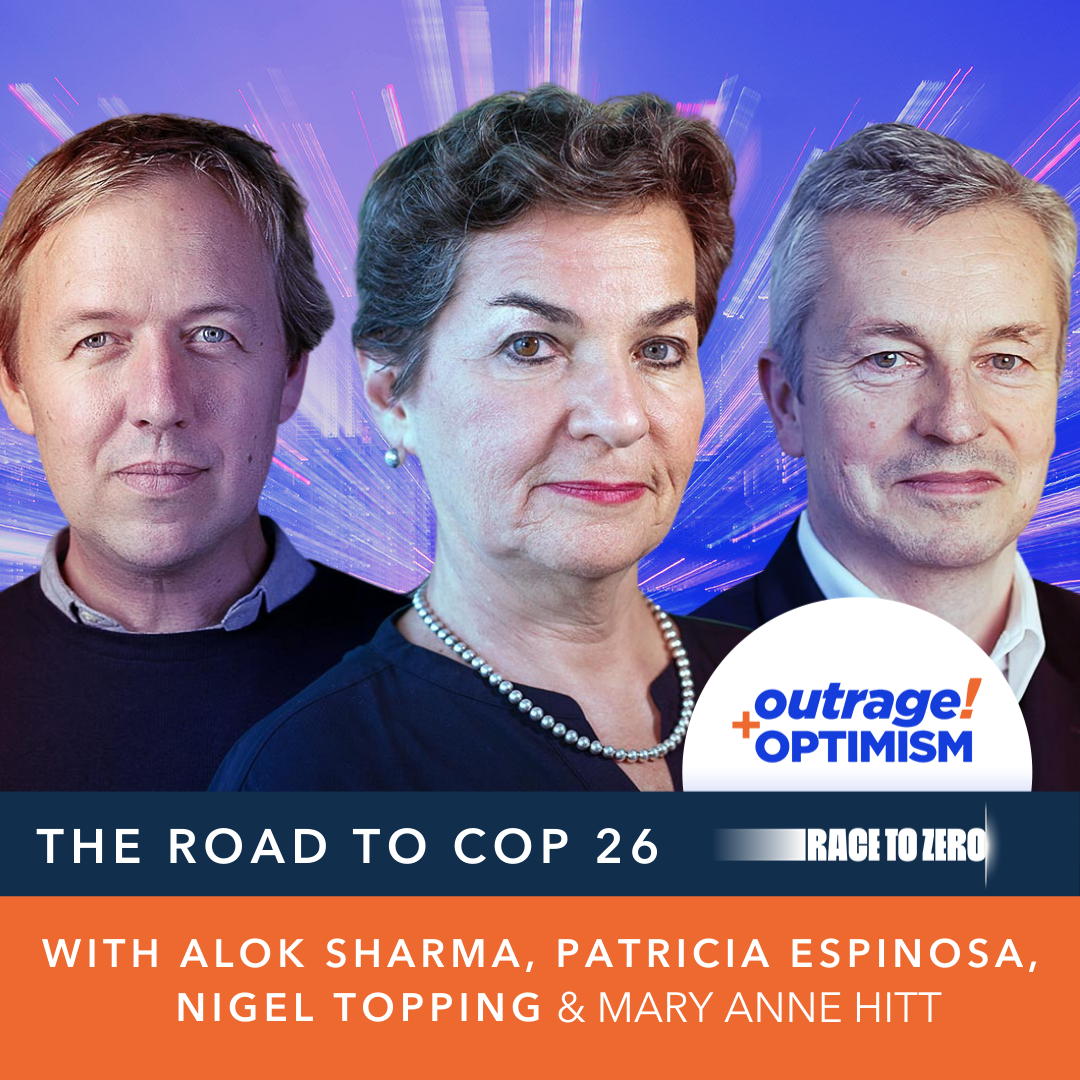

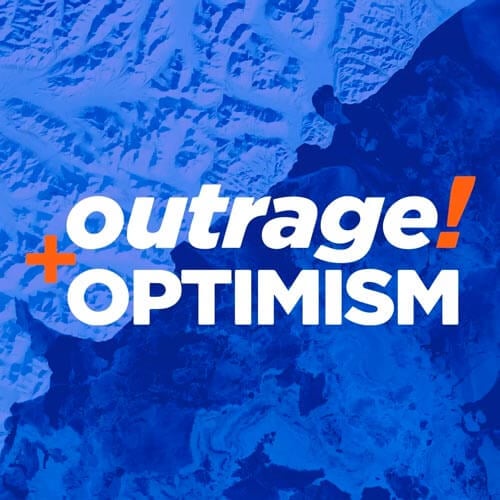
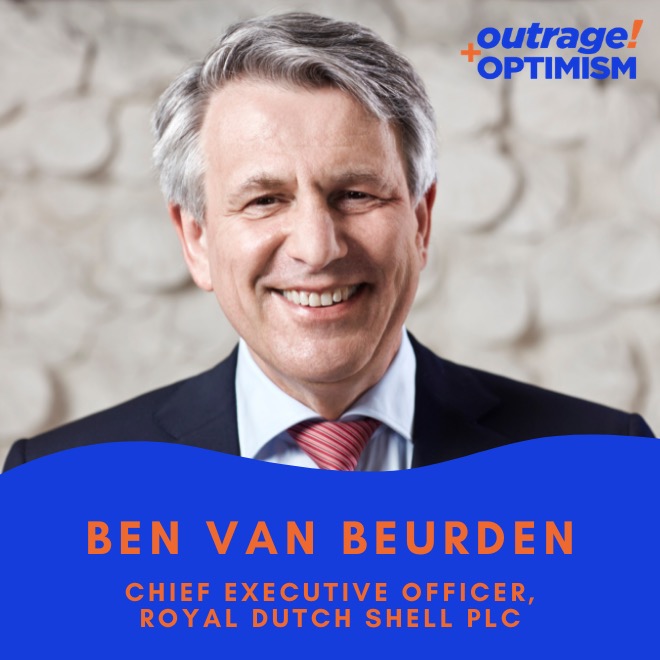
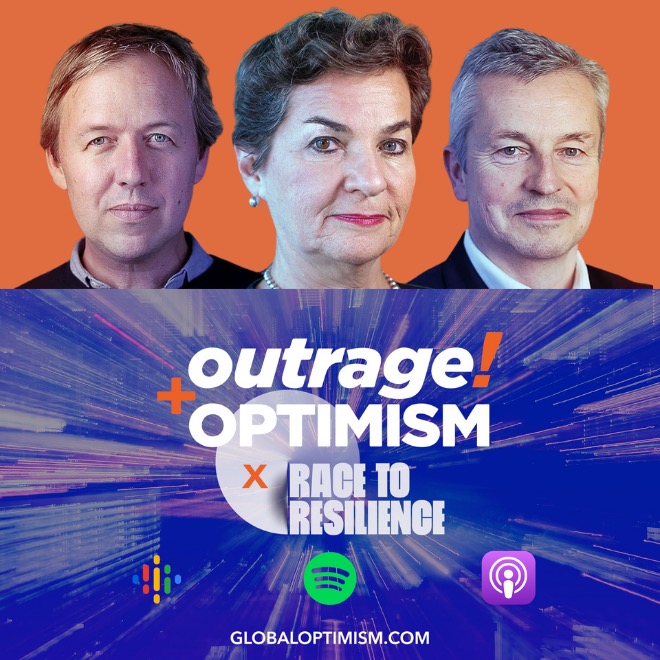
.jpg)
